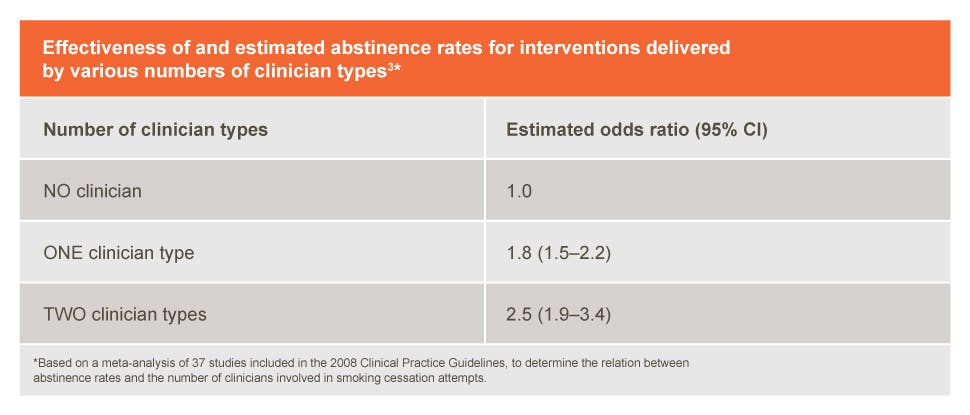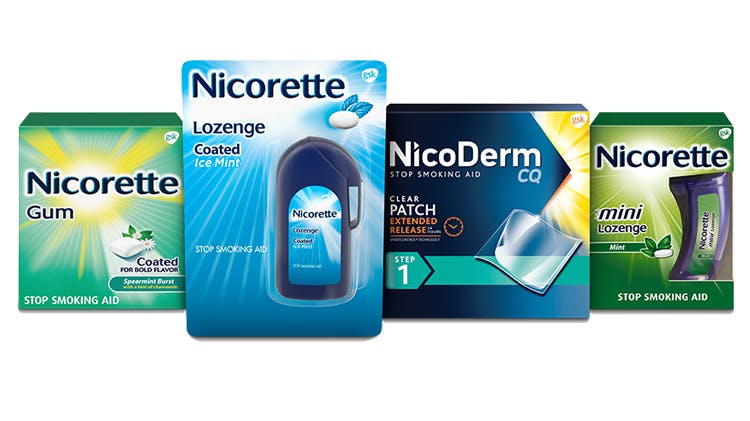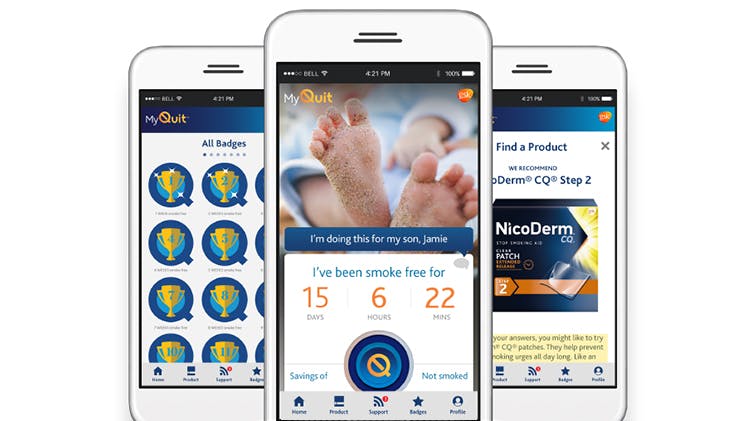Non-Prescription Management Options

HCPs, including pharmacists, can be instrumental in identifying, evaluating, and treating smokers
Studies show that 70% of smokers want to quit smoking, and 82% want their physician to discuss smoking often or at every visit.1,2
Smokers who received smoking cessation advice from 2 or more HCPs were nearly 3 times as likely to make a quit attempt.2

Treatments delivered by more types of clinicians increase abstinence rates
As with all medications, compliance and utilization of proper dosing for the full course of therapy is the key to success.
Developing a quit plan
As a healthcare professional, you have opportunities to discuss smoking with your patients. Perhaps they have admitted to smoking during their health history, or they have come to see you about another illness that may be impacted by smoking.
Once a patient has acknowledged the desire to quit smoking, you can discuss developing his or her personal quit plan. This plan addresses how a patients will proceed and how this change will fit into his or her life.4
An ideal quit plan consists of 6 main components
1 - BUILDING MOTIVATION AND COMMITMENTHelp your patients clarify their reasons for wanting to quit.
2 - OVERCOMING BARRIERS AND TRIGGERSHelp your patients formulate ways to deal with barriers, such as family members who smoke, and triggers, such as drinking coffee or taking a break.
3 - LEARNING COPING SKILLSTeach your patients coping skills, such as engaging in activities to reduce negative moods or lifestyle changes that decrease stress.
4 - GATHERING SUPPORTFriends and family can help. And, at this stage, you can identify medication support, such as nicotine replacement therapy.
5 - DISCOVERING STRENGTHSMake patients realize they have the qualities they need to succeed.
6 - PLANNING THE NEXT STEPSQuitting is a journey. Help your patients incorporate follow-up steps.
Helping your patients quit
As an expert in health and wellness, you are in a position to help your patients make a serious quit attempt. The resources below may help.
Evaluation Questionnaire
Facilitates conversations with your patients about quitting smoking and helps determine the right product for them.
Personal Quit Smoking Plan
Helps you work with your patients to develop individualized strategies for quitting.
The Coping Skills Worksheet
Managing relapse
Your patients may become frustrated with their number of quit attempts and relapses. Smoking cessation education is important to help these patients understand that quitting is a process. It helps to have smoking cessation strategies for patients to follow.
The best way to manage smoking relapse is to prevent it
Smoking relapse prevention involves anticipating and coping in situations that may trigger a relapse. Patients can learn the following coping skills3,5:
- Anticipate and avoid temptations and trigger situations
- Determine strategies to reduce negative moods, such as meditation or yoga
“To cease smoking is the easiest thing I ever did. I ought to know because I’ve done it a thousand times.”
- Mark Twain
Reinforce the commitment to quitting cigarettes
Quitting smoking is difficult. Patients need to overcome physical addiction as well as psychological triggers.
Physical addiction = Release of chemicals caused by nicotine6
Nicotine withdrawal symptoms make it difficult to quit smoking.5,6
Read more about smoking cessation




E-cigarettes/vaporizers (vapes)
Explore health risks and trends of e-cigarettes and vaporizers.

NicoDerm CQ Patch and Nicorette Products
Find out how the NicoDerm CQ Patch and Nicorette products can help your patients.

NicoDerm CQ Patch and Nicorette Products
Find out how the NicoDerm CQ Patch and Nicorette products can help your patients.